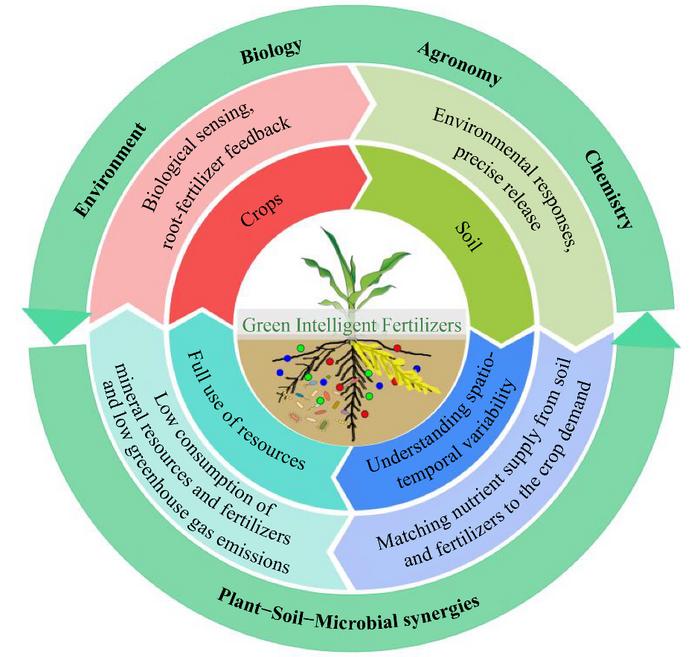Fertilizers are an important strategic material for ensuring food security at the national and personal levels. China has emerged as a pivotal contributor to this development, now being the largest producer and consumer of synthetic fertilizers. However, long-term extensive and unevenness fertilizer use has resulted in macronutrient surpluses and micronutrient lacks in many regions. For a long time, the development of China’s fertilizer industry is dominated by industrial production, and whether fertilizer products match agricultural demands has been overlooked. Fertilizer production has always pursued high concentration, purity, and solubility, which not only fails to improve nutrient utilization but also easily leads to plant nutritional imbalance. The existing fertilizer products are increasingly disconnected from agricultural demands. In addition, the fertilizer industry has high resource consumption, energy consumption, and industrial waste discharge, making it a key guiding industry for the country to implement dual carbon emission reduction. To align with the principles of green and sustainability, it is imperative to bridge the gap between fertilizer industry and agriculture, promote ecofriendly green chemical technology practices throughout the fertilizer industry chain and foster innovation in the development of novel fertilizers.

Credit: Maoying WANG , Lingyun CHENG , Chengdong HUANG , Yang LYU , Lin ZHANG , Zhenya LU , Changzhou WEI , Wenqi MA , Zed RENGEL , Jianbo SHEN , Fusuo ZHANG
Fertilizers are an important strategic material for ensuring food security at the national and personal levels. China has emerged as a pivotal contributor to this development, now being the largest producer and consumer of synthetic fertilizers. However, long-term extensive and unevenness fertilizer use has resulted in macronutrient surpluses and micronutrient lacks in many regions. For a long time, the development of China’s fertilizer industry is dominated by industrial production, and whether fertilizer products match agricultural demands has been overlooked. Fertilizer production has always pursued high concentration, purity, and solubility, which not only fails to improve nutrient utilization but also easily leads to plant nutritional imbalance. The existing fertilizer products are increasingly disconnected from agricultural demands. In addition, the fertilizer industry has high resource consumption, energy consumption, and industrial waste discharge, making it a key guiding industry for the country to implement dual carbon emission reduction. To align with the principles of green and sustainability, it is imperative to bridge the gap between fertilizer industry and agriculture, promote ecofriendly green chemical technology practices throughout the fertilizer industry chain and foster innovation in the development of novel fertilizers.
Prof. Fusuo Zhang from China Agricultural University and his team, based on the requirements of green and sustainable development, have innovatively proposed the concept of green intelligent fertilizer and its innovative strategies and pathways from the integration of industry and agriculture and interdisciplinary collaboration, in response to the current production status and existing problems in the fertilizer industry. Green intelligent fertilizers are new types of high-quality fertilizers produced based on the principles of optimized plant nutrition that matches crops, soils and the environment, using the big-data intelligent algorithms for targeted supply-demand matching, activating root-fertilizer synergy or feedback by intensifying crop biological potential, developing advanced green manufacturing technology to stimulate crop rhizosphere effects and fully exploiting mineral resources contained in raw materials. Such fertilizers have the characteristics of high nutrient efficiency, low-carbon production and use footprint, and maximized utilization of nutrient resources in the whole industry chain.
Green intelligent fertilizers serve as an important entry point for integrating the fertilizer industry and agricultural chain via green transformation of the fertilizer production, and represent a transformative approach to optimizing crop nutrient management. It proposes several innovative pathways based on the sustainability, efficiency and circular economy principles. (1) Activating root-fertilizer synergy by intensifying crop biological potential. (2) Sensing soil environment by intelligent materials for precise nutrient release. (3) Dynamically matching nutrient release and crop demand. (4) Fully utilizing rock mineral nutrient resources and industrial byproducts to create new green fertilizers with low resource and environmental costs.
In the new era, green development is the new concept for national development in China, and the research and development of new green agricultural inputs is of importance. The development of green intelligent fertilizer has become an important starting point for the green transformation of the whole fertilizer and agriculture industry chain. Prof. Zhang Fusuo and his team has collaborated with Yunnan Yuntianhua Co., Ltd. to successfully produce green intelligent fertilizers for rice, macadamia, maize, and potato, achieving synergistic goals of fertilizer efficiency, yield enhancement and quality improvement.
This study has been published on the Journal of Frontiers of Agricultural Science and Engineering in Volume 11, Issue 1, 2024, DOI: 10.15302/J-FASE-2024547.
Journal
Frontiers of Agricultural Science and Engineering
Method of Research
Experimental study
Subject of Research
Not applicable
Article Title
Green intelligent fertilizers—A novel approach for aligning sustainable agriculture with green development
Article Publication Date
23-Feb-2024



